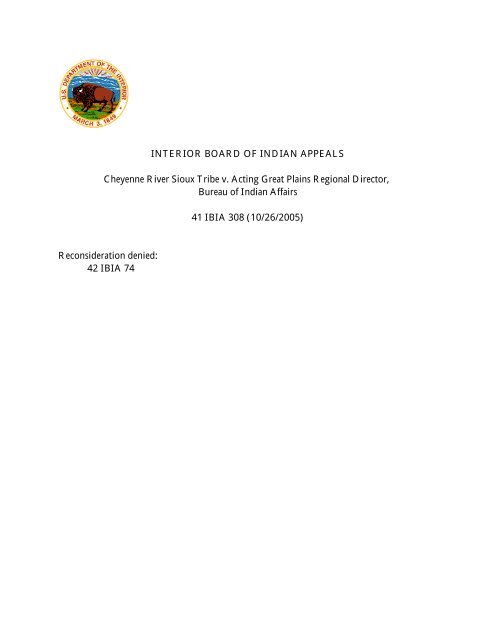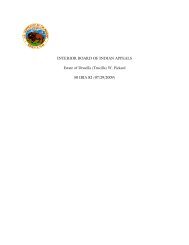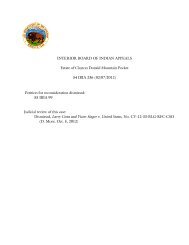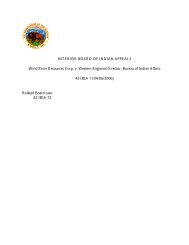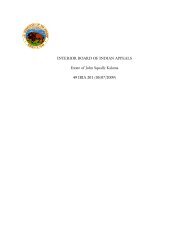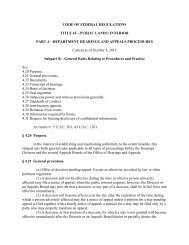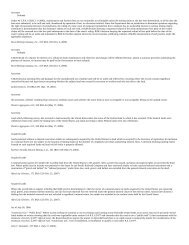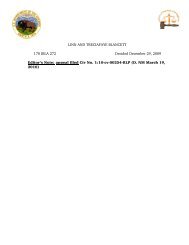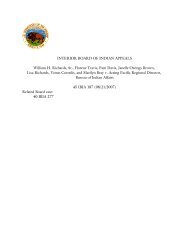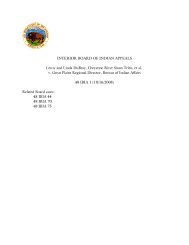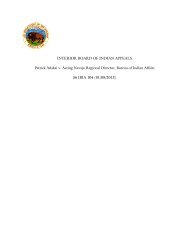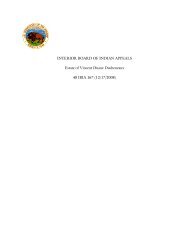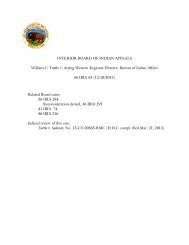41 IBIA 308 - About the Office of Hearings and Appeals
41 IBIA 308 - About the Office of Hearings and Appeals
41 IBIA 308 - About the Office of Hearings and Appeals
You also want an ePaper? Increase the reach of your titles
YUMPU automatically turns print PDFs into web optimized ePapers that Google loves.
INTERIOR BOARD OF INDIAN APPEALS<br />
Cheyenne River Sioux Tribe v. Acting Great Plains Regional Director,<br />
Bureau <strong>of</strong> Indian Affairs<br />
<strong>41</strong> <strong>IBIA</strong> <strong>308</strong> (10/26/2005)<br />
Reconsideration denied:<br />
42 <strong>IBIA</strong> 74
United States Department <strong>of</strong> <strong>the</strong> Interior<br />
OFFICE OF HEARINGS AND APPEALS<br />
INTERIOR BOARD OF INDIAN APPEALS<br />
801 NORTH QUINCY STREET<br />
SUITE 300<br />
ARLINGTON, VA 22203<br />
CHEYENNE RIVER SIOUX TRIBE,<br />
Appellant,<br />
v.<br />
ACTING GREAT PLAINS REGIONAL<br />
DIRECTOR, BUREAU OF INDIAN<br />
AFFAIRS,<br />
Appellee.<br />
: Order Dismissing Appeal<br />
:<br />
:<br />
:<br />
: Docket No. <strong>IBIA</strong> 04-12-A<br />
:<br />
:<br />
:<br />
: October 26, 2005<br />
The Cheyenne River Sioux Tribe (Tribe) seeks review <strong>of</strong> a September 16, 2003 decision<br />
<strong>of</strong> <strong>the</strong> Acting Great Plains Regional Director, Bureau <strong>of</strong> Indian Affairs (Regional Director;<br />
BIA), increasing <strong>the</strong> rental rate for certain grazing l<strong>and</strong> on <strong>the</strong> Cheyenne River Reservation<br />
(Reservation). For <strong>the</strong> reasons stated below, <strong>the</strong> Board dismisses <strong>the</strong> appeal.<br />
Background<br />
The Board recently described <strong>the</strong> regulatory regime pertaining to <strong>the</strong> setting <strong>of</strong> grazing<br />
rental rates in Rosebud Indian L<strong>and</strong> <strong>and</strong> Grazing Association v. Great Plains Regional Director,<br />
<strong>41</strong> <strong>IBIA</strong> 298 (2005). In brief, with limited exception, federal regulations require a party wishing<br />
to graze on Indian trust l<strong>and</strong> to obtain a permit to do so. 25 C.F.R. § 166.200. Permits may be<br />
issued by <strong>the</strong> Indian l<strong>and</strong>owner, whe<strong>the</strong>r a tribe or individual Indians, subject generally to BIA<br />
approval. 25 C.F.R. §§ 166.203 & 166.217. Alternatively, permits may be issued by BIA under<br />
certain circumstances, including if <strong>the</strong> Indian l<strong>and</strong>owner grants it written authority to do so.<br />
Id. § 166.205(a).<br />
BIA establishes <strong>the</strong> grazing rental rate for individually owned Indian l<strong>and</strong>s <strong>and</strong> for tribal<br />
l<strong>and</strong> where <strong>the</strong> tribe has not established <strong>the</strong> rate. Id. § 166.400(b). Procedures for establishing<br />
<strong>the</strong> grazing rental rate are set forth in 25 C.F.R. § 166.401; procedures for adjusting <strong>the</strong> rate,<br />
annually or on a periodic basis as specified in <strong>the</strong> grazing permit, are set forth in 25 C.F.R.<br />
§ 166.408.<br />
<strong>41</strong> <strong>IBIA</strong> <strong>308</strong>
The Tribe regulates grazing permits on Indian l<strong>and</strong>s within <strong>the</strong> Reservation pursuant to<br />
Grazing Ordinance #71. Section I.20 <strong>of</strong> <strong>the</strong> ordinance provides that grazing rental rates are set<br />
by <strong>the</strong> Tribe for tribal l<strong>and</strong> <strong>and</strong> by BIA for allotted l<strong>and</strong>. According to <strong>the</strong> Tribe’s opening brief,<br />
<strong>the</strong> grazing rental rate set by <strong>the</strong> Tribe for tribal l<strong>and</strong>s during <strong>the</strong> 2004 grazing season was $5.00<br />
per animal unit month (AUM). 1/<br />
On September 16, 2003, <strong>the</strong> Regional Director issued a Memor<strong>and</strong>um to <strong>the</strong><br />
Superintendent <strong>of</strong> <strong>the</strong> Cheyenne River Agency establishing a new grazing rental rate for allotted<br />
l<strong>and</strong>s on <strong>the</strong> Reservation for <strong>the</strong> 2004 grazing season. 2/ The new rate was set at $13.55 per<br />
AUM <strong>and</strong> applied to <strong>the</strong> new grazing permit period beginning November 1, 2003. In setting<br />
<strong>the</strong> new rate, <strong>the</strong> Regional Director adopted a recommendation made by <strong>the</strong> <strong>Office</strong> <strong>of</strong> Appraisal<br />
Services <strong>of</strong> <strong>the</strong> <strong>Office</strong> <strong>of</strong> <strong>the</strong> Special Trustee.<br />
The Tribe filed a timely appeal <strong>of</strong> <strong>the</strong> Regional Director’s decision. The Tribe<br />
subsequently filed a statement <strong>of</strong> reasons <strong>and</strong> an opening brief. The Regional Director filed<br />
an answer brief. The Tribe did not file a reply brief.<br />
Discussion<br />
The Tribe makes three general challenges to <strong>the</strong> 2004 grazing rental rate: (1) <strong>the</strong> grazing<br />
rate is not supported by substantial evidence <strong>and</strong> is arbitrary <strong>and</strong> capricious; (2) <strong>the</strong> rate is not in<br />
<strong>the</strong> best interests <strong>of</strong> <strong>the</strong> allottees <strong>and</strong> thus violates <strong>the</strong> trust obligations <strong>of</strong> <strong>the</strong> United States; <strong>and</strong><br />
(3) <strong>the</strong> Regional Director violated 25 C.F.R. § 166.408 by failing to properly consult with <strong>the</strong><br />
Tribe in determining <strong>the</strong> rate <strong>and</strong> by providing untimely notice <strong>of</strong> <strong>the</strong> changed rate.<br />
It is not necessary for <strong>the</strong> Board to reach <strong>the</strong> merits <strong>of</strong> <strong>the</strong> Tribe’s claims because <strong>the</strong><br />
Board concludes that <strong>the</strong> Tribe does not have st<strong>and</strong>ing to bring this appeal <strong>and</strong>, even if it did have<br />
st<strong>and</strong>ing, <strong>the</strong> appeal has become moot.<br />
1/ Animal Unit Month (AUM) means “<strong>the</strong> amount <strong>of</strong> forage required to sustain one cow or one<br />
cow with one calf for one month.” 25 C.F.R. § 166.4.<br />
2/ The Regional Director described <strong>the</strong> rate as <strong>the</strong> “minimum grazing rental rate.” Prior<br />
regulations required BIA to establish “a reservation minimum acceptable grazing rental rate.”<br />
25 C.F.R. § 166.13(b) (2000). Those regulations, however, were no longer in effect at <strong>the</strong> time<br />
<strong>of</strong> <strong>the</strong> Regional Director’s decision. The pertinent regulations provide for <strong>the</strong> setting <strong>of</strong> “<strong>the</strong><br />
grazing rental rate.” 25 C.F.R. § 166.400(b) (2003).<br />
<strong>41</strong> <strong>IBIA</strong> 309
Although <strong>the</strong> Board is not bound by <strong>the</strong> case or controversy requirement <strong>of</strong> Article III <strong>of</strong><br />
<strong>the</strong> U.S. Constitution, as a matter <strong>of</strong> prudence, <strong>the</strong> Board generally limits its jurisdiction to cases<br />
in which <strong>the</strong> appellant can show st<strong>and</strong>ing <strong>and</strong> where claims have not become moot. See Citizens<br />
for Safety <strong>and</strong> Environment v. Acting Northwest Regional Director, 40 <strong>IBIA</strong> 87, 92 (2004)<br />
(st<strong>and</strong>ing); Pueblo <strong>of</strong> Tesuque v. Acting Southwest Regional Director, 40 <strong>IBIA</strong> 273, 274 (2005)<br />
(mootness).<br />
The Board relies on <strong>the</strong> analysis provided in Lujan v. Defenders <strong>of</strong> Wildlife, 504 U.S. 555<br />
(1992), to evaluate st<strong>and</strong>ing. The burden is on <strong>the</strong> appellant to show: (1) an injury to a legally<br />
protected interest that is concrete <strong>and</strong> particularized, as well as actual or imminent <strong>and</strong> not<br />
conjectural or hypo<strong>the</strong>tical; (2) that <strong>the</strong> injury is causally connected with or fairly traceable to <strong>the</strong><br />
actions <strong>of</strong> <strong>the</strong> appellee <strong>and</strong> not caused by <strong>the</strong> independent action <strong>of</strong> a third party; <strong>and</strong> (3) that it is<br />
likely, as opposed to speculative, that <strong>the</strong> injury will be redressed by a favorable decision. See<br />
Lujan, 504 U.S. at 560-61, cited in Citizens for Safety <strong>and</strong> Environment, 40 <strong>IBIA</strong> at 93. As to<br />
mootness, it may occur when nothing turns on <strong>the</strong> outcome <strong>of</strong> an appeal, such that <strong>the</strong> appeal no<br />
longer presents a case or controversy. See Pueblo <strong>of</strong> Tesuque, 40 <strong>IBIA</strong> at 274.<br />
The Tribe alleges two types <strong>of</strong> injuries that will result from <strong>the</strong> increase in <strong>the</strong> grazing<br />
rental rate. First, <strong>the</strong> Tribe alleges that <strong>the</strong> increase will harm individual allotment owners who<br />
are members <strong>of</strong> <strong>the</strong> Tribe because <strong>the</strong> large difference between <strong>the</strong> tribal l<strong>and</strong> rate <strong>of</strong> $5.00 <strong>and</strong><br />
<strong>the</strong> allotment rate <strong>of</strong> $13.55 will cause lessors to elect not to obtain permits for allotted l<strong>and</strong>s.<br />
Second, <strong>the</strong> Tribe alleges that <strong>the</strong> increase will harm <strong>the</strong> Tribe because, if <strong>the</strong> allotted l<strong>and</strong>s are<br />
not permitted, <strong>the</strong>y will fall into disrepair <strong>and</strong> disuse <strong>and</strong> deprive <strong>the</strong> reservation economy from<br />
<strong>the</strong> income <strong>the</strong>y generate, <strong>and</strong> <strong>the</strong> allottees will be more dependent on <strong>the</strong> Tribe for economic<br />
assistance.<br />
The Tribe does not have st<strong>and</strong>ing to sue based on <strong>the</strong>se claims <strong>of</strong> injury to <strong>the</strong> Tribe. The<br />
Tribe does not have a legally protected interest in ensuring that grazing rental rates set by BIA<br />
for allotted l<strong>and</strong>s do not injure <strong>the</strong> Tribe’s economy. BIA has no legal duty to ensure that <strong>the</strong><br />
grazing rental rate does not negatively affect <strong>the</strong> Tribe’s economy. Federal regulations require<br />
BIA to set <strong>the</strong> rate at <strong>the</strong> “fair annual rental,” which is defined as “<strong>the</strong> amount <strong>of</strong> rental income<br />
that a permitted parcel <strong>of</strong> Indian l<strong>and</strong> would most probably comm<strong>and</strong> in an open <strong>and</strong> competitive<br />
market.” See 25 C.F.R. §§ 166.400(b) & 166.4. BIA’s legal responsibility in setting a grazing<br />
rate is to <strong>the</strong> owner <strong>of</strong> <strong>the</strong> trust l<strong>and</strong> to which <strong>the</strong> rate applies. See Fort Berthold L<strong>and</strong> <strong>and</strong><br />
Livestock Ass’n v. Great Plains Regional Director, 35 <strong>IBIA</strong> 266, 277 (2000). Because <strong>the</strong> BIA<br />
grazing rental rate at issue in this appeal applies only to allotted l<strong>and</strong>s, BIA’s responsibility is to<br />
<strong>the</strong> allottees, not to <strong>the</strong> Tribe.<br />
Moreover, even if <strong>the</strong> Tribe could establish that it had a legally protected interest in<br />
ensuring that <strong>the</strong> grazing rental rate did not harm its economy or result in more burdens on its<br />
<strong>41</strong> <strong>IBIA</strong> 310
assistance programs, it still could not establish an injury sufficient to meet <strong>the</strong> requirements <strong>of</strong><br />
st<strong>and</strong>ing. To establish st<strong>and</strong>ing, <strong>the</strong> Tribe must allege an injury that is “actual or imminent,” not<br />
“conjectural” or “hypo<strong>the</strong>tical.” Lujan, 504 U.S. at 560. The Tribe’s allegations here, that <strong>the</strong><br />
BIA grazing rental rate will cause individual allotments <strong>and</strong> allotment owners long-term<br />
economic hardship that will harm <strong>the</strong> tribal economy <strong>and</strong> increase burdens on tribal programs,<br />
alleges a highly conjectural <strong>and</strong> hypo<strong>the</strong>tical injury that does not meet <strong>the</strong> requirements <strong>of</strong><br />
st<strong>and</strong>ing.<br />
The Tribe also cannot establish st<strong>and</strong>ing to sue on behalf <strong>of</strong> <strong>the</strong> allotment owners. Under<br />
prudential (as opposed to constitutional) rules <strong>of</strong> st<strong>and</strong>ing, a party “generally must assert his own<br />
legal rights <strong>and</strong> interests, <strong>and</strong> cannot rest his claim to relief on <strong>the</strong> legal rights or interests <strong>of</strong><br />
o<strong>the</strong>rs.” Warth v. Seldin, 422 U.S. 490, 499 (1975); see also United States v. Santee Sioux Tribe,<br />
254 F.3d 728, 734 (8th Cir. 2001). Third party st<strong>and</strong>ing may be granted in exceptional<br />
circumstances where <strong>the</strong> party asserting <strong>the</strong> right has a close relationship with <strong>the</strong> person who<br />
possesses <strong>the</strong> right <strong>and</strong> where <strong>the</strong>re is a hindrance to <strong>the</strong> third party’s ability to protect his own<br />
interests. See Kowalski v. Tesmer, 543 U.S. 125, , 125 S. Ct. 564, 567 (2004), citing Powers<br />
v. Ohio, 499 U.S. 400, <strong>41</strong>1 (1991). Here, <strong>the</strong>re is no hindrance to <strong>the</strong> individual allotment<br />
owners’ ability to appeal <strong>the</strong> BIA’s determination <strong>of</strong> <strong>the</strong> grazing rental rate to <strong>the</strong> Board. Thus,<br />
<strong>the</strong> Tribe lacks third-party st<strong>and</strong>ing.<br />
Ano<strong>the</strong>r <strong>the</strong>ory under which <strong>the</strong> Tribe could attempt to assert st<strong>and</strong>ing is parens patriae<br />
st<strong>and</strong>ing. A sovereign entity may sue as parens patriae for its citizens when <strong>the</strong> sovereign alleges<br />
injury to a sufficiently substantial segment <strong>of</strong> its population, articulates an interest apart from <strong>the</strong><br />
interests <strong>of</strong> particular private parties, <strong>and</strong> expresses a quasi-sovereign interest. 3/ See Alfred L.<br />
Snapp & Son, Inc. v. Puerto Rico, 458 U.S. 592, 607 (1982). While <strong>the</strong> <strong>the</strong>ory <strong>of</strong> parens patriae<br />
st<strong>and</strong>ing has developed primarily based on suits by states on behalf <strong>of</strong> <strong>the</strong>ir citizens, courts have<br />
recognized that <strong>the</strong> <strong>the</strong>ory also may apply to tribes suing on behalf <strong>of</strong> <strong>the</strong>ir members. See, e.g.,<br />
Table Bluff Reservation (Wiyot Tribe) v. Philip Morris, Inc., 256 F.3d 879, 885 (9th Cir. 2001).<br />
It does not appear, however, that courts have addressed parens patriae st<strong>and</strong>ing <strong>of</strong> tribes<br />
in actions against <strong>the</strong> federal government. A state does not have st<strong>and</strong>ing as parens patriae to<br />
bring an action against <strong>the</strong> federal government because a state’s citizens are also citizens <strong>of</strong> <strong>the</strong><br />
United States, which represents those citizens parens patriae with respect to federal governmental<br />
rights. Id. at 486. See Alfred L. Snapp, 458 U.S. at 610 n.16, citing Massachusetts v. Mellon,<br />
262 U.S. 447, 485-486 (1923); see also City <strong>of</strong> Olmsted Falls v. Federal Aviation Admin.,<br />
292 F.3d 261, 268 (D.C. Cir. 2002); State ex rel. Sullivan v. Lujan, 969 F.2d 877, 883 (10th Cir.<br />
1992).<br />
3/ Because <strong>the</strong> Board concludes that parens patriae st<strong>and</strong>ing does not apply here for o<strong>the</strong>r<br />
reasons, <strong>the</strong> Board does not reach <strong>the</strong> question <strong>of</strong> whe<strong>the</strong>r <strong>the</strong> Tribe could meet <strong>the</strong>se<br />
requirements <strong>of</strong> parens patriae st<strong>and</strong>ing.<br />
<strong>41</strong> <strong>IBIA</strong> 311
We need not decide whe<strong>the</strong>r <strong>the</strong> Tribe could have parens patriae st<strong>and</strong>ing in an<br />
administrative appeal against BIA, however, because in this case <strong>the</strong> Tribe cannot meet <strong>the</strong><br />
requisite requirements because it does not allege injury to a sufficiently substantial segment <strong>of</strong> its<br />
population. Some courts have held that <strong>the</strong> doctrine <strong>of</strong> parens patriae only allows a sovereign to<br />
bring actions that are asserted on behalf <strong>of</strong> all <strong>of</strong> <strong>the</strong> sovereign’s citizens. See Santee Sioux Tribe,<br />
254 F.3d at 734, citing Louisiana v. Texas, 176 U.S. 1, 19 (1900). Indeed, courts repeatedly have<br />
declined to recognize parens patriae st<strong>and</strong>ing <strong>of</strong> tribes where <strong>the</strong> tribe does not act on behalf <strong>of</strong><br />
<strong>the</strong> collective interests <strong>of</strong> all <strong>of</strong> its members. See Santee Sioux Tribe, 254 F.3d at 734; Kickapoo<br />
Tribe <strong>of</strong> Oklahoma v. Lujan, 728 F. Supp. 791, 795 (D.D.C. 1990); Assiniboine & Sioux Tribes<br />
v. Montana, 568 F. Supp. 269, 277 (D. Mont. 1983). Even if parens patriae st<strong>and</strong>ing may be<br />
appropriate where <strong>the</strong> interests <strong>of</strong> fewer than all tribal members is at stake, it is not appropriate<br />
here, where <strong>the</strong> Tribe’s members include both livestock operators <strong>and</strong> allotment owners, who<br />
may have competing interests on <strong>the</strong> question <strong>of</strong> <strong>the</strong> grazing rental rate. 4/ See 13A Charles<br />
Alan Wright, Arthur R. Miller, <strong>and</strong> Edward H. Cooper, Federal Practice & Procedure, § 3531.11<br />
(2005) (st<strong>and</strong>ing for sovereign on behalf <strong>of</strong> citizens not appropriate where sovereign entity “may<br />
be choosing sides between different groups <strong>of</strong> citizens with conflicting interests”).<br />
Finally, even if <strong>the</strong> Tribe had st<strong>and</strong>ing at <strong>the</strong> time it filed its appeal, its claims would be<br />
moot. Mootness is “<strong>the</strong> doctrine <strong>of</strong> st<strong>and</strong>ing set in a time frame: <strong>the</strong> requisite personal interest<br />
that must exist at <strong>the</strong> commencement <strong>of</strong> <strong>the</strong> litigation (st<strong>and</strong>ing) must continue throughout its<br />
existence (mootness).” Arizonans for Official English v. Arizona, 520 U.S. 43, 68 n.22 (1997)<br />
(internal quotations <strong>and</strong> citations omitted). Here, <strong>the</strong> injury alleged by <strong>the</strong> Tribe is that <strong>the</strong><br />
individual allotments will not be leased <strong>and</strong> will fall into disuse. The Regional Director, however,<br />
provided with her answering brief a declaration by <strong>the</strong> Superintendent <strong>of</strong> <strong>the</strong> Cheyenne River<br />
Agency, BIA, signed February 18, 2004, attesting that all available permits for individual Indian<br />
allotted l<strong>and</strong>s had been issued for <strong>the</strong> 2004 grazing season, with one exception. Thus, <strong>the</strong> injury<br />
alleged by <strong>the</strong> Tribe did not occur, <strong>and</strong> <strong>the</strong> relief sought by <strong>the</strong> Tribe — a grazing rate that would<br />
enable <strong>the</strong> allotments to continue be economically productive — has in effect been granted.<br />
Hence, <strong>the</strong> Tribe’s appeal is moot. Cf. Hall-Houston Oil Company v. Western Regional<br />
Director, 40 <strong>IBIA</strong> 33 (2004) (dismissing appeal as moot where Regional Director provided<br />
relief sought).<br />
4/ The only communication <strong>the</strong> Board has received from an allotment owner is a letter from<br />
allottee Leroy C. Curley stating his support for <strong>the</strong> BIA’s decision to set <strong>the</strong> grazing rental rate at<br />
$13.55 per AUM, as well as his belief that many if not most <strong>of</strong> enrolled tribal members agree<br />
with his position.<br />
<strong>41</strong> <strong>IBIA</strong> 312
Conclusion<br />
Therefore, pursuant to <strong>the</strong> authority delegated to <strong>the</strong> Board <strong>of</strong> Indian <strong>Appeals</strong> by <strong>the</strong><br />
Secretary <strong>of</strong> <strong>the</strong> Interior, 43 C.F.R. § 4.1, <strong>the</strong> Board dismisses this appeal. The September 16,<br />
2005 decision <strong>of</strong> <strong>the</strong> Regional Director establishing <strong>the</strong> 2004 grazing rental rate for <strong>the</strong><br />
Reservation st<strong>and</strong>s.<br />
I concur:<br />
// original signed // original signed<br />
Ka<strong>the</strong>rine J. Barton<br />
Steven K. Linscheid<br />
Acting Administrative Judge<br />
Chief Administrative Judge<br />
<strong>41</strong> <strong>IBIA</strong> 313


